Nigeria is one of the most blessed nations in the world in terms of farming or agricultural resources. Talk of fertile and productive soil, and good weather conditions among other factors to consider before starting a farm, Nigeria is blessed with all of these.
To start a profitable farming business in Nigeria, you will need good capital, knowledge of farming, good farmland, and manual labor among many others.
So here in this guide, I will give you a step-by-step guide on how you can start a farming business in Nigeria, and all you need to know.
How To Start Farming Business In Nigeria Beginners Guide
To start a lucrative farming business here in Nigeria, here are what you need to know first;
Read Also: 10 Best Fertilizers For Plantain Farm In Nigeria
What is your area of specialization?
In farming, there are broad areas you can choose from, these areas have been entrenched into two fields and they are animal husbandry and plant husbandry.
Do you have the skill set needed for your area of specialization?
If you are venturing into either animal husbandry or plant husbandry, you will need the skill set for any of them you choose.
Read Also: 15 Best Beans Fertilizer In Nigeria [Organic & Inorganic]
We have to make detailed and step-by-step guides on how you can go about any of these in our articles on this blog, you may search for them and read more on them.
Types of Farming In Nigeria
Animal Husbandry:
Here you may choose to venture into piggery, fish farming, livestock farming, egg production, and many others.
Read Also: 12 Requirements To Start A Poultry Farming Business
Fish Farming:
Here you will raise fingerlings into full-grown fish for human consumption. To start fish farming in Nigeriafish farming in Nigeria, you will need at least 300,000 nairas.

Goat Farming:
To start goat farming, you need the male and female goats to copulate and start producing offspring. It is these offspring that you sell to make your profit.
To Start goat farming in NigeriaStart goat farming in Nigeria, it will cost you at least 50,000 to 100,000 naira, depending on the size of Farm you are planning.
Snail Farming:
This is an act of raising snails for human consumption. There are many snail farmers in Nigeria, it is one of the fast-growing farming businesses in the country.
To start snail farming in Nigeriastart snail farming in Nigeria, it will cost you at least 20,000 to 30,000 naira for a start.
Poultry:
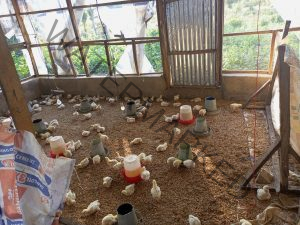
Here you can raise layers for egg production or broilers for meat consumption.
To start poultry Farming in Nigeria start poultry Farming in Nigeria, you will need at least 200,000 to 300,000 naira for a start depending on the size you want to start.
We have prepared a detailed write-up on how to start any of the farming types listed above.
Plant Husbandry:
In this area, you may choose to venture into various crop production, either long-term yielding plants such as palm fruit, cocoa, and cashew or short-time yielding plants such as maize, millet, rice, tomatoes, etc.
Tomatoes Farming:
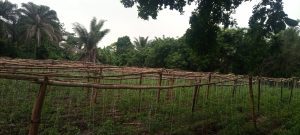
This is one area in crop production that can never be saturated. People consume tomatoes in the different forms daily and the farmers in these areas are not adequate.
So, you can think of going into this area. If you need information on how to go about this, you can read it here.
To start tomatoes farming in Nigeria start tomatoes farming in Nigeria, it will cost you between 50,000 and 100,000 naira.
Palm Fruit Farming:

Growing palm fruit for red oil production is in high demand in Nigeria, this is an everlasting investment you can dabble into. The demand and consumption of red oil are always on the high side. So you can think of venturing into this as well.
To start Palm fruit farming business Palm fruit farming business, it will cost you at least 500,000 to 700,000 naira.
Cocoa Farming:
Most rich farmers in Nigeria are assumed to be cocoa farmers. Growing cocoa for the cocoa seed is lucrative farming you can venture into.
To start cocoa farming business in Nigeria,cocoa farming business in Nigeria, it will cost you between 500,000 and 1,000,000 naira.
We will talk about each of them later in this content.
Step By Step Guide To Start Plant farming In Nigeria (Plant Husbandry)
To start plant farming in Nigeria, there are things you need to put in place:
Step One: You need to secure a good farmland
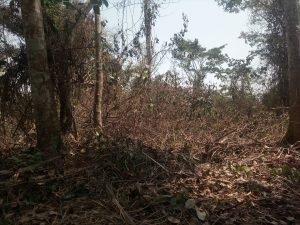
The area of land you will be needing is predominantly dependent on the type of farm you want to start. If you are starting a palm fruit farm or cocoa farm, you will be needing not less than 1 acre of land for a start.
If you are starting a tomatoes farming, you will be needing at least a plot of land or more.
If you are starting rice farming, you will be needing at least 1 acre of land.
If you are starting a short-term farm, you must at least get a plot of land.
Price of farmland in Nigeria:
To get good farmland here in Nigeria, you will have at least 100,000 to 300,000 naira. If you need farmland in Ondo state, Osun, Abeokuta, and Nigeria, you can contact us to get you good farmland.
Step Two: Farmland Clearing

You will need to clear the farmland. The most difficult and tasky aspect of farming is the clearing stage. To clear your farmland, you may deploy two options, if it is a large area of land, you may hire the service of a Payloader or tractor to clear the land once.
This process is the fastest and will take you under 2 days to finish the clearing.
Another option you can deploy is the use of Manual Labor, you can go to rural areas such as Benue, Kogi, and other states where farming is predominate to hire a year boy to help clear the farmland.
This process may take a longer time such as a week or more depending on the size of the farmland.
Tips:
While clearing, ensure you look out for snails before setting the farm on fire, you can make additional stipends doing this.
Step Three: Parking and Burning of cleared bushes
Next thing is to clear the cleared bushes and set fire to them. This will make your farming activities easier and less tedious
Step Four: Felling and Cross-cutting of Trees
Depending on the crop you want to plant, it is always advisable to fall and clear tall and short trees and shrubs in the farmland. This will help reduce the rate of weed growth, and climber’s growth and give room for direct sunlight on whatever you plant.
If you are planting Cocoa, you may need not fall trees that may act as protective from direct sunlight till the plant is mature.
Tips:
Cross-cutting this tree, you can make money from it by selling it to timber contractors or to local users who may need it to cook such as bakeries and others.
Step Five: Plough the land
This is optional anyway if you are planting on a newly deforest farmland. Though it is advisable because doing this helps mix your soil and it helps remove strong roots, shrubs, and other underground stems in your farmland.
But if you do not have enough funds for the farmland, you may need to skip this till your next planting season.
Step Six: Spray The Farmland With Herbicides
If you do not want much stress in course of your farming, ensure you spray with herbicides such as atrazine or other chemicals that may reduce the rate of weed growth.
Tips:
Ensure you read about suitable herbicides suitable for every plant you intend to plant to avoid destroying your crops.
Step Seven: Start Heaping
Depending on what you want to plant, if you are planting tomatoes or maize only, you will need to make straight ridges. If you are planting cassava, you may need a heap that is shown in the Figure below:
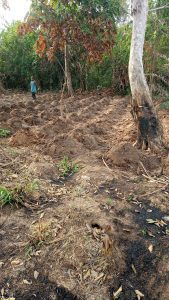
Tips:
You do not need a heap or ridges for cocoa or palm seed, you can plant them directly on the farmland.
Step Eight: Start Planting
Now you can start planting your crops.
Step Nine: Ensure you Weed
To make your plants grow well with a good yield, you will need to spray with herbicides periodically to avoid weed interference with your plant production.
Step Ten: Apply fertilizer
Applying fertilizer to your farmland ensures your plants’ growths with desired results and as well prevent some plant disease that may want to infest your crops.
Step By Step Guide To Start Animal farming In Nigeria (Animal Husbandry)
If you are interested in animal husbandries such as poultry, fishery, piggery, goat farming, dairy farming, and others, there are things you need to put in place.
Step One: Secure Your Farm Location
When selecting and scouting for your farm location, ensure you secure it away from residential places, and also ensure to situate it where it is accessible to a good road network.
Take for example, when sitting a Poultry, if you site it too close to a residential area, the odor coming from your farm may affect people living close to your farm.
Step Two: House Preparation
Whatever you may be interested in raising, you will need to secure and raise their shelter, take, for example, you will need a battery cage for your poultry, a source of water, and other things that will make your livestock be in good order.
Step Three: Buying your livestock
If you are interested in catfish farming, for example, you will need fingerlings, hatchery, and others just like in the image below
Tools Needed for Farm Business in Nigeria
There are various tools or equipment that you may need for farming and they include;
Plant farming
- Cutlass
- Hoes
- Tractors
- File
- Sprayer
- Rainboot
- Overall jacket
Animal farming
- Hatchery
- Ponds
- Cages
- Borehole
- PPE
Factors Affecting Farming In Nigeria
Lack of or Inadequate Fund:
The major challenge most people in the farming sector today in Nigeria is a lack of funds. To buy seed or seedlings is cost, to buy farmland is a cost, and chemical and farm maintenance cost huge money which may not be necessarily available for new farmers.
Lack Of Storage Facilities:
Many produce from farmers in Nigeria hardly get to market before most of it got spoilt. The cost of storage or buying the devices to store varieties of these facilities is costly.
Lack Of Government Support:
In Nigeria today, there are different government schemes, loans, and grants that hardly get to farmers, most of the promise and government schemes end on radio, paper, and in office, and farmers are not usually the direct beneficiaries.
How much does it cost to start a farm in Nigeria?
To start a farming business in Nigeria, you will have at least 300,000 nairas outside the amount needed to secure your farm location.
Which farming is most profitable in Nigeria?
The most profitable farming in Nigeria is animal farming such as fishery, piggery, and poultry.
How do I register as a farmer in Nigeria?
To register as a farmer in your area, you need to locate an agriculture development project liaison office in your area to put down your name.
Is rabbit farming profitable in Nigeria?
You can start a lucrative agricultural business in Nigeria by raising rabbits. Commercial rabbit farming is a lucrative business opportunity for anyone interested in animal husbandry or livestock production.
How can I farm pigs in Nigeria?
When looking for land in Nigeria to start a pig farming business, keep these features in mind:
Water that is pure and fresh enough to drink.
Good public transit.
Away from the commuting area.
Food can be found close to fields.
Access to a wide range of veterinary care.
How can I start goat farming in Nigeria?
Select a Location for Your Farm. It’s critical that you find the right spot to set up your goat farm.
Get the right Shed for your goat
Purchase the Essentials for a Goat Farm Start-up.
Management of Goat Feeding Operations.
How do I start a farm business?
It takes a lot of work to start a farm, whether it’s for personal use or as a business venture. Numerous issues must be taken into account before starting a farm, including devising a strategy, locating suitable land, and building a solid financial foundation, as well as learning how to grow crops and acquiring the necessary equipment.
Conclusion
How to start farming in Nigeria is not that difficult, what is needed is simply a focused mind and determined spirit. This alone will keep you going in days you are yet to see anything on your farm.
If you need assistance with sitting your farming in Nigeria and all you need to do, you can drop your comment in the comment section below.

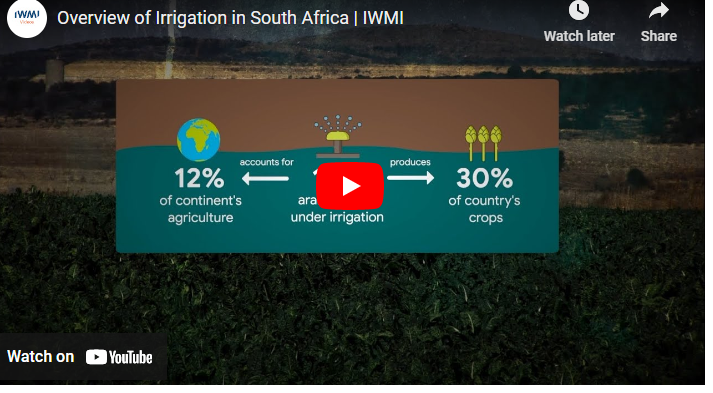
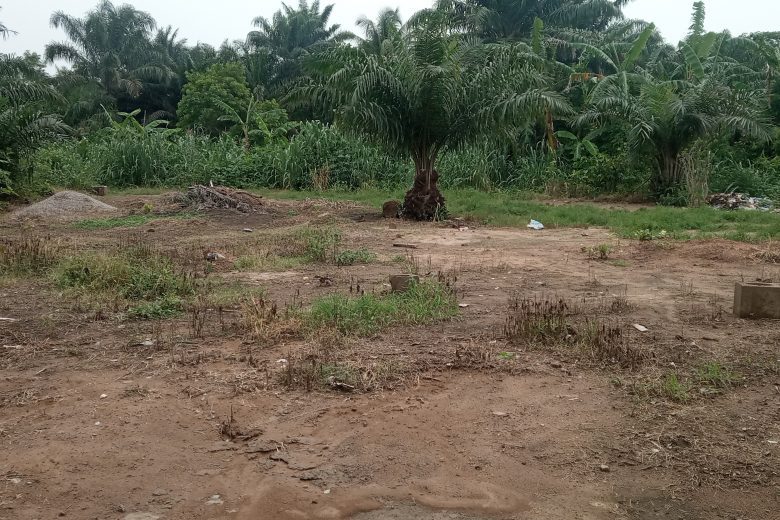

6 Replies to “[Beginners Guide] How To Start Farming Business In Nigeria”